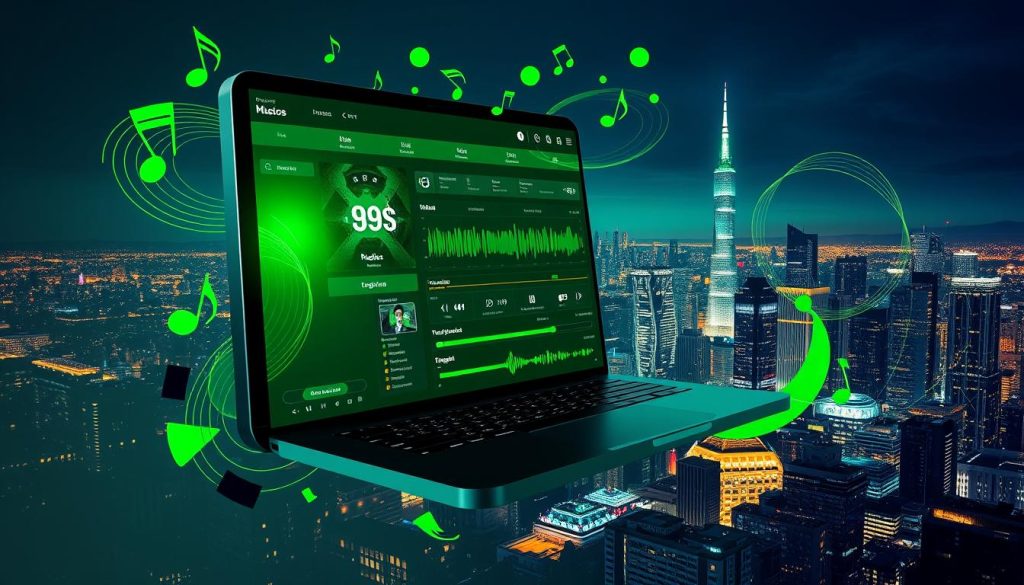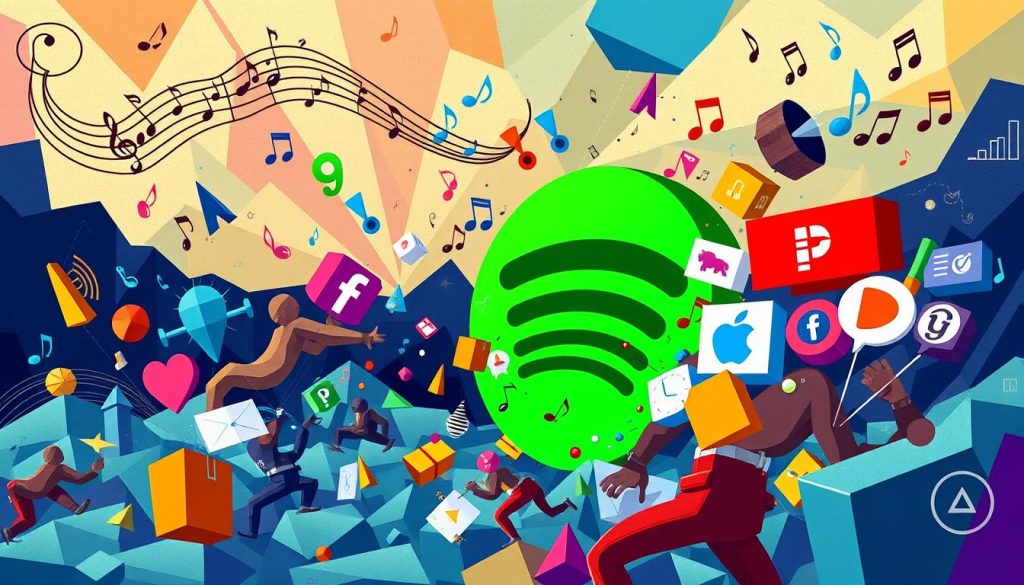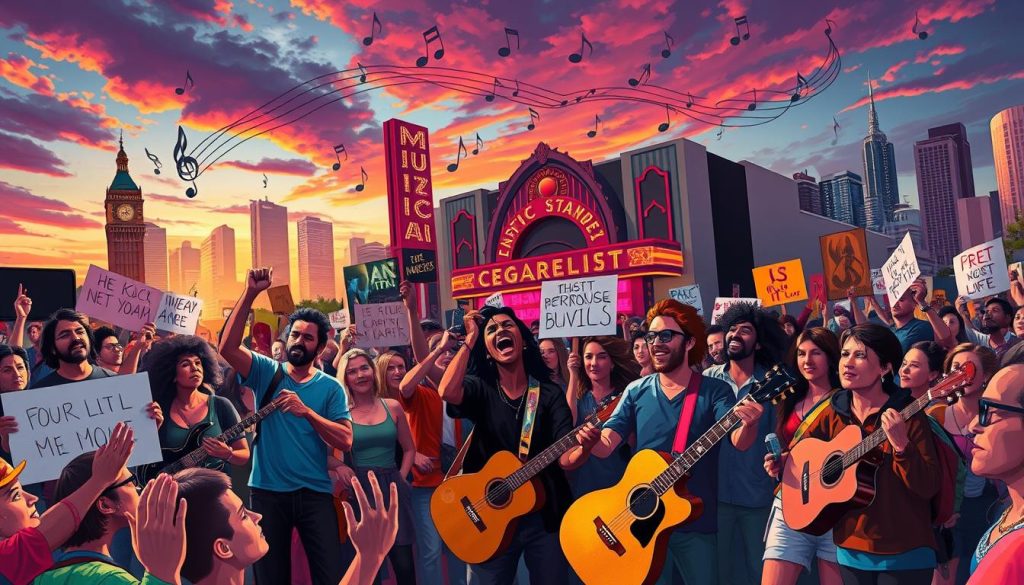The music world has changed a lot since streaming services like Spotify came along. At the core of this fight is the argument over royalty payments and revenue distribution between Spotify and music publishers. With streaming now the top way people listen to music, the gap between Spotify’s way of doing things and what artists and publishers want has grown bigger1. This piece will dive into the main points of the Spotify vs. publishers fight, how it affects artists, and what it might mean for the music industry in the future.
Key Takeaways
- The ongoing battle between Spotify and music publishers over royalty payments and revenue distribution has intensified as streaming becomes the dominant mode of music consumption.
- Spotify’s algorithms have been criticized for favoring certain artists over others, leading to concerns about fairness and equitable compensation for artists1.
- Royalty rates for streaming and other mechanical uses are set to rise by 44% in the US market over the next five years, but Spotify and Amazon have filed appeals against this decision2.
- Many songwriters find it challenging to sustain their profession in the era of streaming music, where they earn only hundreds of dollars for millions of streams2.
- The future of the music industry may shift towards automatically generated music, posing new challenges for artists and publishers1.
Spotify’s Controversial Business Practices
Spotify, the top music streaming service, has been criticized for how it pays artists. Many artists say they don’t get fair pay3.
Spotify pays royalties based on an artist’s share of streams. This hurts independent and lesser-known artists, who say they get very little per stream3.
Allegations of Unfair Artist Compensation
Stars like Taylor Swift and Thom Yorke have pulled their music from Spotify in protest. They’re upset about how Spotify splits its revenue and pays artists3.
A Swedish musician made just a busker’s daily wage in six months on Spotify3. A record label, Racing Junior, made only $3 after 55,100 streams3. An artist needs over four million streams a month to make the U.S. minimum wage3.
There are campaigns for fairer royalties. The Union of Musicians and Allied Workers (UMAW) wants one cent per stream for artists on Spotify3. But Spotify pays artists about $0.004 per stream on average3.
The CEO of Merlin Network, a digital rights agency, says Spotify pays labels, not artists. Merlin’s labels have seen a 250% increase in payments from Spotify3.
“In France, major labels kept 73% of Spotify Premium payouts, while writers/publishers received 16%, and artists received 11%.”3
These claims of unfair pay have led to debates and lawsuits. Artists and groups are fighting Spotify’s business methods.
The Battle for Streaming Revenue
The music streaming world is a battleground. Spotify and music publishers are locked in a fight over how much money they make. With fewer people buying physical music, the battle for more streaming money is getting fiercer4.
Music publishers, led by the National Music Publishers Association (NMPA), say Spotify doesn’t pay enough. They believe artists and songwriters deserve more. Spotify, on the other hand, thinks it’s helping the industry by making people pay for music instead of stealing it45.
This fight is about copyright law and who gets the best deal. The CRB, a Library of Congress panel, decides how much songwriters get paid. Every five years, they meet to set these rates, and it’s always a big deal4.
| Streaming Royalty Breakdown | Percentage |
|---|---|
| Performing Artist and Record Label | 75-80% |
| Publishing (Songwriters and Publishers) | 20-25% |
The music streaming world makes billions in royalties. But, who gets what is a big issue. Publishers want more money, and the NMPA is pushing for laws to help them. They say Spotify is trying to pay less by bundling services56.
As the fight for streaming money goes on, both sides are fighting hard. The outcome will shape the music industry’s future in a changing world456.
Spotify and publishers war
The fight between Spotify and music publishers has sparked a lot of debate. At the core, it’s about licensing disputes, copyright conflicts, and fair revenue sharing in the streaming economics world7.
Spotify has been accused of not fairly paying artists. The company is said to not pay enough mechanical royalties to songwriters and publishers. Spotify has settled two lawsuits over this, agreeing to pay $3.82 per song, while the law allows up to $150,0007. Seven other publishers have also sued Spotify for not paying mechanical royalties7.
Spotify claims it shouldn’t have to pay mechanical royalties, saying the law doesn’t cover streaming as reproduction7. But the music world says streaming does need a mechanical license, and a court has ruled against Spotify’s view7. Still, Spotify says it needs mechanical rights but doesn’t pay for them7.
The National Music Publishers Association (NMPA) fights for a change in the compulsory license system. They say Spotify takes advantage of the current system8. The NMPA CEO, David Israelite, believes a simple change in Congress could fix a 100-year-old mistake8.
The fight between Spotify and publishers has grown, with the Mechanical Licensing Collective suing Spotify over mechanical royalties8. Publishers worry about songwriters’ earnings in the streaming age. Spotify calls the NMPA’s actions a “press stunt” and says it’s paying more to publishers and societies in 2023, with even more in 20248.
The outcome of this fight will greatly affect the music industry. It will decide if artists and songwriters can make a living from their work.
In the music industry’s changing world, the fight between Spotify and music publishers is key. Both sides fight for control and a fair share of the streaming market. As the industry deals with licensing disputes, copyright conflicts, and revenue sharing, the future of music and artists’ livelihoods are at stake.
The Impact on Artists
The fight between Spotify and music publishers has hit artists hard, especially those who are independent or not well-known. Many artists have spoken out against Spotify’s9 low royalty payments. Stars like Taylor Swift and Thom Yorke have even pulled their music from Spotify in protest9.
Independent artists say the money they get from Spotify streams is not enough. They find it unacceptable.
Protests and Campaigns for Fair Compensation
Artists have come together to protest Spotify’s unfair practices. They want a fair share of the money made from their music. The9 Union of Musicians and Allied Workers (UMAW) started the #JusticeAtSpotify movement. They want at least one cent per stream.
Other groups like the10 American Songwriter Association International (NSAI), Music Artists Coalition (MAC), and the Recording Academy are also upset. They stress the need for fair pay for music creators.
The fight for fair streaming royalties has been tough. A recent ruling to increase songwriter royalties by over 40 percent in five years is a positive step. But10 Spotify’s fight against this ruling worries many writers about their future with the platform.
Despite the hurdles, some artists and groups are still hopeful. They believe Spotify will change its ways and pay artists fairly10. The9 Coalition of Concerned Creators and the10 Recording Academy Songwriters + Composers Wing are determined to keep fighting for fair pay. They know how crucial artists are to the music world910.
The Future of Music Streaming
The fight between Spotify and music publishers is ongoing, making the future of music streaming uncertain11. This battle will affect how artists get paid and how money is shared11.
Experts say the current streaming model might need big changes. This could happen through new laws or platforms that focus more on artists11. Finding a balance between profit and fair pay for creators is key to the future of music streaming11.
12 Millions of people now pay monthly for music, changing the old music business12. But, many artists find their pay too low12.
13 Streaming prices have stayed the same in the US for 20 years, despite new tech and more music13. This price fight affects how money is shared in music13.
12 Big streaming services are looking at new ways to share money fairly and help artists financially12. These changes, along with possible law updates, could change the music streaming industry11.
“The state of the music business is transitioning from a ‘herbivore market’ to a ‘carnivore market,’ indicating a shift in dynamics for music streaming platforms.”13
The future of music streaming depends on how well streaming platforms can adapt and pay artists fairly11.
Conclusion
The fight between Spotify and music publishers over money has been a big deal for years14. This issue affects artists a lot, especially those who are not well-known. They find it hard to make money from their music on streaming sites15.
Even though Spotify won a case against Eminem’s publisher, Eight Mile Style, for about £30 million15, the fight for fair pay is still going on. This shows how hard it is to solve this problem.
Finding a fair way to pay artists is key as the music world changes14. Spotify, publishers, and artists need to work together. They must create new ways to make sure everyone gets a fair share.
This legal battle highlights the challenges of music licensing in today’s digital world14. It shows we need better ways to manage data and talk to each other in the music business.
It’s important to balance the needs of artists, publishers, and streaming sites for the music industry’s future15. Eminem, with 76 million monthly listeners on Spotify15, is just one artist who deserves fair pay. Solving this issue will affect many in the music world.
FAQ
What are the key issues at the center of the Spotify vs. publishers war?
How does Spotify’s compensation model impact artists?
What are the main arguments from Spotify and music publishers in this ongoing battle?
How has the war between Spotify and music publishers impacted artists?
What are the potential future implications of the Spotify vs. publishers war?
Source Links
- Justice at Spotify | Hacker News
- Spotify and Amazon ‘sue songwriters’ with appeal against 44% royalty rise in the United States – Music Business Worldwide
- Criticism of Spotify
- Music Publishers Escalate Their War With Spotify
- Inside the Multi-Billion Dollar Battle Royale Over Music-Streaming Royalties
- The NMPA, Spotify and the Battle of the Bundle
- How Spotify Has Waged War With The Music Industry
- Music Publishers Escalate Their War With Spotify
- Spotify’s Estimated $150M Songwriter Royalty Cuts: Music Industry Reactions (Updating)
- Threats, Bullying and Misinformation: Inside Spotify’s Battle With Songwriters
- The Future of Streaming Services May Be In The Past
- How Streaming Changed The Music Industry
- The Future Of Music Business With Economist Will Page
- Spotify Wins Legal Battle Over Eminem’s Music Rights – A Complex Case of Licensing and Royalties
- Spotify wins case over ‘billions’ of Eminem streams



